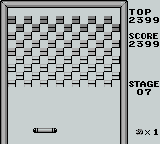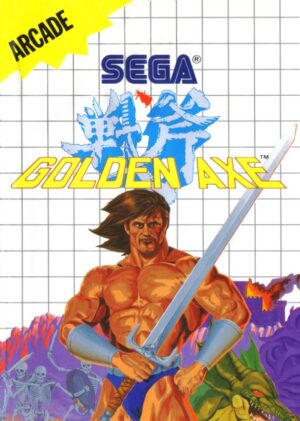Retro Replay Review
Gameplay
Alleyway delivers a classic Breakout-style experience, tasking the player with guiding a podship along the bottom of the screen to keep a bouncing ball in play. As Mario, your sole tool is this paddle-like vessel, which slides horizontally in response to your directional inputs. The simplicity of the core mechanic—deflect the ball, hit the blocks—belies the satisfying tension that emerges once the blocks begin to cascade downward.
(HEY YOU!! We hope you enjoy! We try not to run ads. So basically, this is a very expensive hobby running this site. Please consider joining us for updates, forums, and more. Network w/ us to make some cash or friends while retro gaming, and you can win some free retro games for posting. Okay, carry on 👍)
Yet Alleyway spices up the familiar formula with a handful of clever wrinkles. Rotating sections of blocks force you to adjust your angle of attack on the fly, and periodic vertical drops of the entire field inject a sense of urgency. As the mass of bricks creeps ever closer to your podship, every deflection feels more consequential, turning a straightforward arcade pastime into a test of nerves.
The game’s progression system is straightforward: clear every block in a level to advance. While there are no power-ups or multiple balls to juggle, the shifting tables and changing block patterns continually reset the challenge. Despite its stripped-down nature, Alleyway strikes a solid balance between accessible pick-up-and-play action and escalating difficulty that will keep even seasoned arcade fans engaged.
Graphics
On the original Game Boy’s monochrome screen, Alleyway’s visuals are clean and functional. Blocks stand out crisply against the plain background, and Mario’s podship is immediately recognizable even in its pixelated form. The game eschews flashy effects in favor of clarity—there’s never any doubt about where the ball is or how it’s interacting with the environment.
The repeating block patterns form simple yet artful arrangements, and occasional shifts in color palette (shades of gray on the Game Boy, green on the Super Game Boy peripheral) freshen the look without overcomplicating the display. Animations are minimal but snappy—each collision between ball and block is accompanied by a brief, satisfying flash, giving visual weight to every hit.
Alleyway’s graphical fidelity may feel rudimentary by modern standards, but its art direction embraces the constraints of early handheld hardware. The game’s visual design communicates everything you need to know at a glance, preserving the tight, responsive feel that is essential for any brick-busting title.
Story
Storytelling is not Alleyway’s primary concern. In lieu of a narrative campaign, the game drops you into an abstract environment where the sole goal is to demolish every block on the screen. Mario’s role as pilot of the “podship” is mostly cosmetic, offering a familiar face from the Nintendo stable rather than a plot-driven rationale for your actions.
That said, the lack of an elaborate storyline doesn’t detract from the experience—it aligns perfectly with the pick-up-and-play nature of arcade-style titles. There’s a certain purity in the design: no cutscenes, no dialogue, just you, the ball, and an ever-shifting wall of bricks. Each cleared stage feels like a small victory, free from narrative trappings.
For players seeking deep lore or character development, Alleyway will feel skeletal. However, as a straightforward arcade diversion, its minimalist approach is part of its charm. The simplicity allows you to focus entirely on timing, precision, and adapting to each level’s unique twist without getting bogged down in story complications.
Overall Experience
Alleyway stands out as a polished, bite-sized arcade romp that translates the essence of Breakout into a handheld format. Its quick levels and simple controls make it ideal for short bursts of play, whether you have a few minutes on the commute or want to unwind between other gaming sessions. The game’s steady ramp-up in difficulty ensures you’ll find yourself chasing “just one more level” even after you think you’ve had enough.
While purists may miss traditional Breakout power-ups or boss battles, Alleyway’s strategic block rotations and downward shifts create a fresh layer of challenge. The balance between predictability and surprise keeps every stage engaging, and the Game Boy’s portability means you can practice your paddle skills anywhere.
In the end, Alleyway succeeds on its own terms. It doesn’t aspire to be a sprawling adventure; instead, it refines a timeless concept into an addictive handheld package. If you appreciate tight, reflex-based gameplay and have nostalgia for early portable arcades, Alleyway is a solid addition to your library—and a reminder that sometimes, the simplest games are the most enduring.
 Retro Replay Retro Replay gaming reviews, news, emulation, geek stuff and more!
Retro Replay Retro Replay gaming reviews, news, emulation, geek stuff and more!









Reviews
There are no reviews yet.